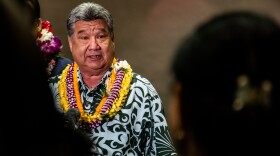Tuesday's new COVID-19 case count was 824 — down from Monday's 1,384 new cases. Lt. Gov. Josh Green, who is also an emergency room doctor on Hawaiʻi Island, shared what to know about the latest numbers.
———
On the current state of COVID-19 in Hawaiʻi
JOSH GREEN: Today we have 824 cases and we have 112 people in the hospital, of whom 53 are vaccinated, which is to say they've had two shots. Twenty people are in the intensive care unit, and our positivity rate's at 12.2%. So we are still surging, definitely, with COVID and the Omicron surge. What we're seeing right now is that our hospital numbers have risen, they've tripled over the last two weeks. And that stands to reason because there are a lot more cases. But with this number of cases, we would have otherwise expected a far higher number in the hospital. And our current hospitalization rate is about 0.77% of those cases we confirmed — so 112 people in the hospital, and we have 14,514 active cases. So that tells us that Omicron is very contagious — spreading like wildfire, but less severe. And people who are vaccinated and boosted are not getting so sick that they end up in the intensive care unit. That's kind of how we're looking at it now. And I expect that the cases will likely surge as far as the raw count through mid-January, somewhere between around the 10th to the 15th of January, our case counts will be very high. And then our hospital counts should peak, based on what's going on currently, around Jan. 20. And then that will come down. The question remains, how many total cases will be in the hospital and whether we can handle it. And that's why we're gonna bring in some extra help.
On possibly evolving the Safe Travels program as the pandemic continues
The Safe Travels program may need to evolve again. It's been one of the tools that has kept us among the safest in the country. You know, we still have the lowest rate of COVID in the country and the second-lowest mortality rate — by a large margin. So that has worked for us in spite of the fact that we're a super tourist destination. But we may have to change a little bit because you will see some cases come through. That's obviously the case. Now, the cases from travelers are not the predominant cases, in spite of what other people might like to share because they like to distinguish us versus them — and that's not a healthy distinction. We see very few cases that end up in the state of Hawaiʻi that require care if they've traveled here. Almost no one has required hospitalization from their travels. And the spread that we do see, is, of course, community spread because we are with each other five times as much. We're spending all that time with our families and our coworkers, that's how COVID spreads. However, there may be the need to go to the next step of Safe Travels, which is to have people be boosted, or tested — which is to say, the full criteria to get past having to go into quarantine would be to have your vaccination plus a booster, so boosted or fully tested within 72 hours of travel. That will also help us, but by the time that gets implemented, we're gonna be past the peak of this particular surge. It's just a matter of really describing what it means to be vaccinated.
On testing more people for COVID-19 at airports
We can, but it's impossible what other people are proposing. And it is frustrating to see repeat proposals of what people know, first of all, to be unconstitutional — you can't force people to have a medical procedure or test. You can force them to go into quarantine. You cannot force people into a mandated test, you're not allowed to do that. And second, the proposals that often come, and this is a contentious point, which is to test everybody when they come off of a plane, we would have to have 35,000 tests available to us every day. We only have 10 to 12,000 at our peak available. So are those who are proposing this, suggesting we not have any resources to test our own people when they get sick? Is that what they're suggesting? Because I'm actually a health care provider, taking care of patients. And I need those tests to take care of people who are sick. So that argument is not a serious one. That argument is a philosophical one. And I'm a serious person trying to handle a crisis. So I would prefer if people gave proposals that actually could be implemented.
Information on vaccine and testing sites can be found at hawaiicovid19.com/vaccine.
This interview aired on The Conversation on Dec. 28, 2021. The Conversation airs weekdays at 11 a.m. on HPR-1.






